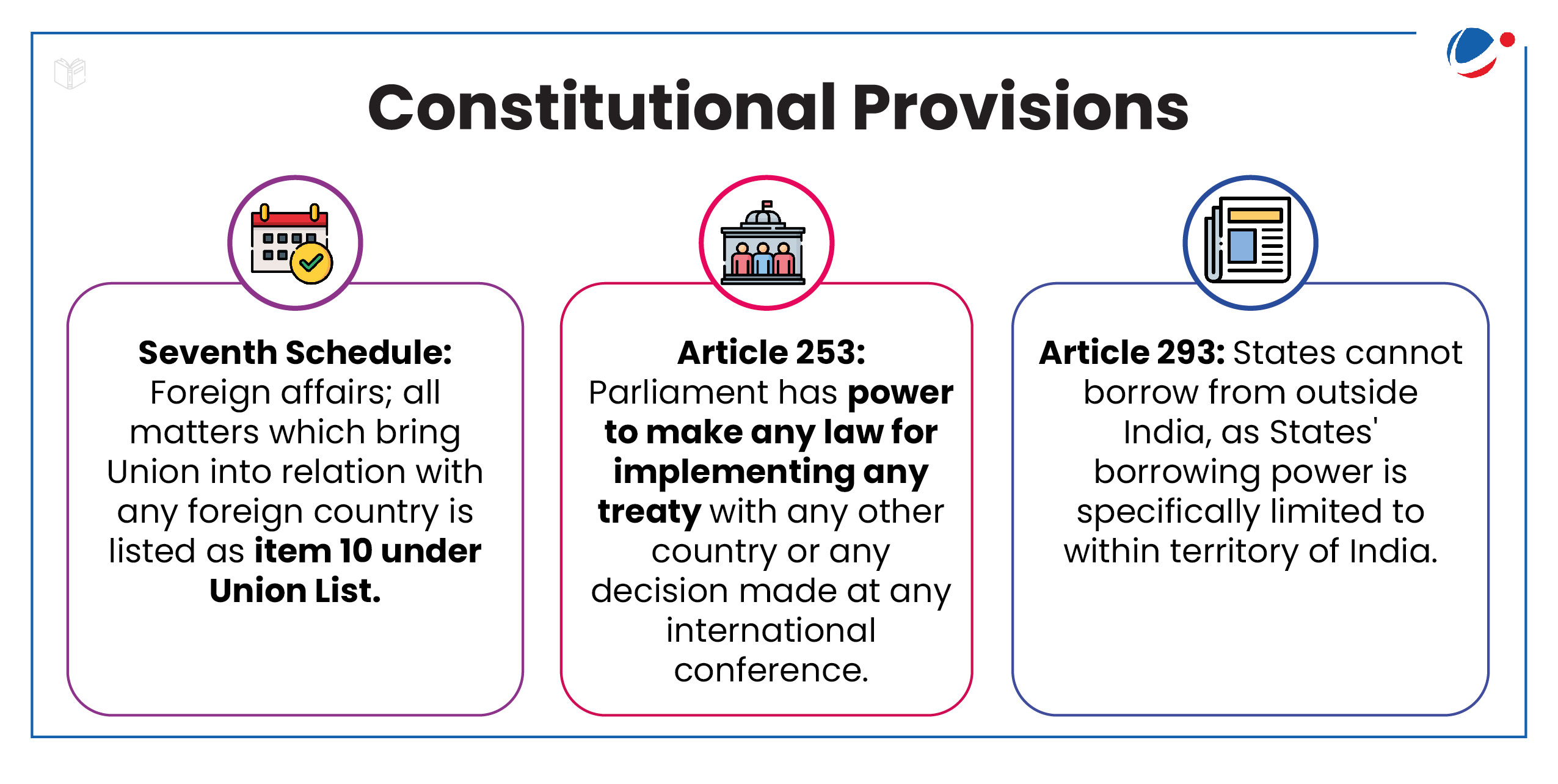Why in the news?
Recently, Ministry of External Affairs (MEA) has criticized Kerala government for appointing 'External Cooperation' Official.
More on news
- According to MEA, State Governments should not intrude into matters that are beyond their constitutional jurisdiction and it is an encroachment on the union list.
- Constitution of India under the seventh schedule, Union list, item 10, clearly specifies that foreign affairs and all matters which bring the Union into relation with any foreign country, are the sole prerogative of the Union Government.
- The move has drawn attention to an aspect of India's foreign policy landscape – the role of subnational entities in shaping international engagement known as "para-diplomacy".
About Para- Diplomacy
- Para-diplomacy deals with the foreign policy capacity of subnational governments.
- It is also known as 'state diplomacy', 'continent diplomacy', 'regional diplomacy', and 'subnational diplomacy'.
- Para-diplomacy makes space for external relations of subnational or federal units that might indulge themselves in international activism to promote their own interests.
- It is opposite to conventional diplomatic relations that fall under exclusive domain of sovereign nation states exercised by central governments.
- Ministry of External Affairs has also set up a new division – "States Division" in 2014 to coordinate with States and Union Territories for further facilitation of their efforts to promote their exports and tourism and attract more overseas investments and expertise.

Need for Para-Diplomacy
Given the diversity and the cultural and geographical interconnectedness of the Indian subcontinent, states have always played a substantial role in foreign policy decision-making.
- Regional Strengths: Para-diplomacy allows states to capitalize on their specific advantages to promote trade and foster cultural exchanges with foreign countries.
- For example, Kerala leveraged its diaspora to promote trade, investment, and cultural exchange with Gulf countries.
- Attracting Investment: States can tailor their investment policies to attract foreign direct investment by showcasing their advantages, such as skilled labour, natural resources etc. and provide a conducive investment climate.
- For example, investment summits organised by various states like Vibrant Gujarat, Progressive Punjab and Vibrant Goa.
- Cultural Diplomacy: Para-diplomacy enables states to strengthen their historical and cultural ties, promoting tourism, cultural exchanges, and educational collaborations.
- For example, Tamil Nadu connections with Sri Lanka rooted in ethnicity, West Bengal ties with Bangladesh rooted in Bengali culture etc.
- Contribution to National Foreign Policy: While foreign policy remains under central government's purview, states can contribute by building relationships that align with national interests, thereby complementing India's overall diplomatic efforts.
- For example, West Bengal CM's visit to Bangladesh in 1996, paved way for the Farrakka Water sharing treaty.
- Strengthen federalism: Para-diplomacy can help strengthen India's federal system by empowering states to play a more active role in international affairs. This can lead to a more decentralized and responsive foreign policy.
Criticism associated with Para Diplomacy
- Constitutional: Foreign affair is under Union List in the Indian Constitution; therefore, states' involvement in international relations could be seen as encroachment on the Union government's powers.
- Resource Constraints: Establishing and maintaining international partnerships, hosting delegations, etc. can put strain on states financial resources.
- Political differences: The political party in power at the state level may have different priorities or ideologies than the central government, leading to conflicts or lack of support by central government.
- For example, Dabhol Project (Maharasthra), began only after active support of the then Central government.
- Divergent Interests: State governments may have interests that diverge from the national foreign policy, leading to inconsistencies and potential conflicts.
- For example, Teesta Water Sharing Agreement was stalled due to resistance from West Bengal Government.
- Bilateral relations: Indirect influence of state governments in foreign policy decisions has potential to affect India's bilateral relations as well as its standing on international laws.
- For example, India's vote on UNHRC resolution against a friendly neighbour, Sri Lanka.
- Security Concerns: Engaging in para-diplomacy might inadvertently affect national security especially in sensitive regions e.g. North East region, states bordering Pakistan or China.
Way ahead
- Institutional mechanism: Effective institutional mechanisms through the creation of consulates or consular offices in individual states or setting up of federal foreign affairs offices under the supervision of the MEA. Inter-State Council (ISC) can also be used for state involvement in foreign policy.
- For example, Ministry of External Relations has established a separate administrative service that creates dialogue with municipalities and federal states in Sao Paulo, Brazil.
- Capacity Building: Allocate adequate resources to state-government and provide training to state officials on international relations, diplomacy, and negotiation skills.
- Best Practices Sharing: Create platforms for states to share best practices and successful para-diplomacy models. Further, regularly assess impact of para-diplomacy initiatives and refine strategies based on feedback and outcomes.
- Regular Assessment: Implement mechanisms to regularly assess the impact of para-diplomacy initiatives and refine strategies based on feedback and outcomes.
- Clear guidelines: States Division, established under MEA, must engage in developing policy formulation and clearer guidelines to strengthen subnational diplomacy, and aligning both states and overall national interests.



